 Workers of the Kalashnikov plant in Izhevsk, Russia, on September, 20, 2016. Photo by Mikhail Svetlov (Getty Images). Courtesy of Fortune
Workers of the Kalashnikov plant in Izhevsk, Russia, on September, 20, 2016. Photo by Mikhail Svetlov (Getty Images). Courtesy of Fortune
The Heroes of the Day: What We Know about the Russian Working Class
How the Proletariat Stopped Fearing TV and Came to Dislike It
Sergei Vilkov
News.ru
April 30, 2019
It has been a tradition on the eve of May Day to recall the working class, which in Russia has seemingly been usurped by televised images of the “patriots” and regular blokes who work at the Uralvagonzavod plant in Nizhny Tagil.
Actually, Russia’s workers are a genuine black hole to sociologists. No one had seriously researched their circumstances, sentiments, and views for thirty years.
The first tentative attempts to research today’s Russian industrial laborers have produced a portrait that many had not expected. It transpires that today’s proletarians, at least, the most politically and civically dynamic among them, almost never watch television. They have a sober take on politics. They are immune to state propaganda. They have a relatively relaxed attitude toward migrant workers.
They regard themselves as outside observers in the debates between the regime and the opposition, not finding their own interests reflected in them. They are more likely to feel trampled upon by plant management than by a new law passed in the State Duma.
It is the factory where they fight their battles, which are usually invisible to official statisticians. Most important, according to researchers, they have more in common with early twentieth century social democrats than with current parties who try and speak on behalf of workers. However, the new research leaves a lot to be desired, to put it mildly. News.ru took a look at it.
They Got What They Fought For
According to official data, 26 million people in Russia or over 36% of the able-boded population are employed in industry, transport, agriculture, fishing, and several similar sectors. These figures do not include, for example, the large numbers of people employed in commerce and services. Overall, however, sociologists estimate that workers make up 40% of Russia’s population. They identify them as the largest group in society.
These people dwell on the dark side of Russia’s moon, as it were. It would be hard to say when someone last tried to examine them through an academic lens. However, understanding the nature of Russian society and its largest segments is, perhaps, the most ambitious humanities research project in the country today.
In government reports, Russia’s workers are imagined as a passive, homogeneous milieu that positively exudes tranquility. In 2017, Rosstat, the state statistics service, recorded only one strike, while in the preceding years their official number oscillated between two and five strikes annually.
By comparison, in 2005, according to official data, there were 2,600 strikes in Russia. And yet the following year, Rosstat claimed the number of strikes had decreased by a factor of 325. Since then, according to official statistics, it has remained consistently scanty, despite the economic crises of 2008 and 2014.
However, the Center for Social and Labor Rights, which has monitored the situation on its own, claims there were an average of 240 labor protests between 2008 and 2014. In 2016, when the political opposition was quiet, there were twice as many labor protests, while in the first six months of 2018, the last period for which it has data, the center recorded 122 strikes and acts of civil disobedience. Nearly half of these incidents led to workers downing tools.
Since 2014, a year dominated by an apparent “patriotic” consensus in politics, the number of strikes has increased abruptly due to an upsurge of resistance in provincial cities, including district seats. The largest number of walkouts and protests occurred in industry, especially the machine building and metalworking sectors, which have accounted for 28% of the overall number of strikes. The transport sector has accounted for the same percentage of strikes and protests, despite the fact they have mainly been carried out by employees of private transport companies based in the cities. The construction industry has accounted for 19% of strikes and protests during the period.
The main cause of protests and strikes remains unpaid back wages, which accounted for 60% of incidents. Demands to raise pay were factors in 19–20% of incidents.
The Center for Social and Labor Rights noticed a curious thing. In 2018, the number of spontaneous, unorganized protests by workers rose abruptly by 22%. Trade unions were involved in a mere 17% of all strikes and protests. The experts claim this was partly due to the fact that the Russian hinterlands, where there have been no real trade unions for the last one hundred years, have taken the lead in labor activism, along with sectors dominated by precarious employment.
Shop Floor Intellectuals
Someone has been organizing these strikes and protests, however. It is evident there is a core of energetic progressive activists among Russia’s workers.
On April 22, Alexander Zhelenin gave a lecture at a round table held in the offices of Novaya Gazeta newspaper.
Zhelenin is a well-known expert on workplace conflicts, and part of his talk dealt with a research study on the Russian proletariat. In July and September 2018, he and his fellow researchers did a small-scale qualitative sociological research study in Kaluga and Omsk that focused on the self-identification and sociopolitical views of workers.
A total of twenty-three people were interviewed. The small sample was offset by a thorough probing, through in-depth interviews, of the respondents’ attitudes and views, which are never revealed by run-of-the-mill public opinion polls. The workers interviewed by the sociologists were somehow connected to independent trade unions, which had, apparently, supported the research study. However, in the main, the interviewees were not politically engaged: only one of them was a member of a political organization.
We should also not forget it is usually the most energetic people who agree to be interviewed for ordinary official public opinion polls, which affects their outcomes.
In Kaluga, the respondents worked in the food industry and the new auto assembly plants, while in Omsk, they were employed at old Soviet military-industrial complex plants. They ranged in age from twenty to fifty, and included women and men. They were quite well-paid technicians who were proud of their contributions to society. On the other hand, they had a constant sense of their status as subordinates. They tended to strongly associate themselves with their workplaces. Family “labor dynasties” were a possible factor in their outlooks.
Most of the workers interviewed at the auto plants had been abroad one or more times, and this partly had to do with Volkswagen’s work exchange programs. One of the things they had learned on these trips was independent trade unions were ordinary, valuable organizations.
On the contrary, a foreign-travel passport was a rarity among the workers of the old defense plants, and yet both groups of workers tended to spend their holidays on the Black Sea coast. Some respondents in Omsk said they had never seen the sea or had seen it in early childhood.
Mortgages were the main financial obstacles to holidays away from home. Financially, the skilled workers felt they were members of the so-called middle class. In terms of standards of living in their regions, however, they noticed the gap between the more affluent segment of the populace and themselves. Thus, they had a keen sense of the difference in life chances for their children and the children of rich families, talking about it with great indignation.
Pavel Kudyukin, ex-minister of labor and employment and a lecturer in public administration at the Higher School of Economics, commented on the growing social segregation in Russia.
“It comes to the fore when talk turns to children’s futures. It is an aspect that will become more acute, because we are moving from segregation to social apartheid. I think it will facilitate [grassroots] civic activism,” he said.
The authors of the report did not hide their amazement at the fact that the respondents were quite well-educated, intelligent people. Nearly a third of them had a higher education or an uncompleted university degree. Many of them pointed out it was ordinary to find university-educated workers on the shop floor.
Tellingly, a man from Kaluga, identified as Anatoly, who did not finish his university degree, and whose outward appearance (a bespectacled intellectual), cultivated manner of speaking, and hobbies (music and organizing non-profit music festivals) gave the researchers the impression he was a local intellectual, although he said he had been employed as a skilled laborer for over eleven years. Like some other respondents, Anatoly noted he had become a laborer because life had worked out that way and he had to earn money. Industry was the only place where it was possible to earn a more or less decent wage, the study noted.
They Have Their Own Values
And yet 74% of of the respondents unambiguously identified themselves as workers, stressing their difference from other groups in society and their direct involvement in production. The remaining 26% preferred to call themselves “employees” and supported the notion of so-called social partnerships with management. However, despite their decent standard of life, it followed from the interviews that the workers believed they occupied one of the lowest rungs on the social ladder. This had to do with their palpably subordinate positions at work and the lack of prestige in their occupations. This circumstance was painfully apparent in the tension between blue-collar and white-collar workers at one plant, a tension exacerbated by the arrogance of the latter towards the former.
The workers were very annoyed by the fact that, as Sergei, a grinder who was involved in the Omsk focus group, said, “In terms of wages and education, the blue-collar workers often outperform the office workers, but the latter still treat them as inferiors.”
In Omsk, for example, the wages of workers fluctuated between 20,000 and 30,000 rubles a month, but workers at some defense plants could earn up to 70,000 or 80,000 rubles a month. However, according to the same interviewee, the well-paid jobs were “inherited.”
Besides, he said, to earn such a wage, one virtually had to live at the factory, working twelve hours a day and enjoying only one day off a week, something not all workers would do. Meanwhile, office workers at the same plant could earn only 20,000 rubles a month, but they treated the workers “as if they were above [them],” said Sergei.
“A really interesting thing is the split in self-identification as workers and members of the middle class,” said Kudyukin. “It clearly manifests the pressure exerted in society by hegemonic views. It is like what Marx wrote: ‘The ideas of the ruling class are in every epoch the ruling ideas, i.e. the class which is the ruling material force of society, is at the same time its ruling intellectual force.’ Since the notion of the middle class is constantly in the air, people give no thought to the fact that it’s a sociological fiction. People realize they are workers. They work on an assembly line or operate a machine. Yet in terms of income they identify themselves as middle class in the sense that they are neither rich nor poor. Maybe this has to do with the notion that the middle class is formally defined by income.”
“Russia is a quite highly stratified country, and it is constantly becoming more stratified,” explained Gregory Yudin, a professor at the Moscow School of Social and Economic Sciences. “It’s not a matter of income gaps, but of what these people say: the sense of symbolic superiority in cases where there is no income gap. When this sense takes root at a particular factory, what happens is quite predictable. In this sense, Marx was more or less right.”
Speaking about their place in production, the workers voiced the opinion their plants could run without managers, but without them the shop floors would grind to a halt. However, they sensed the arrogant attitude towards manual labor that had emerged in other parts of society. They realized that, from this perspective, their status was not considered prestigious at all. The factory laborers responded by opposing the values of their milieu to “other” values, saying that nowadays the chic thing to do was to steal and mooch, to make lots of money for doing nothing.
“I think this is an ordinary means of compensation, a psychological defense mechanism. We are considered impoverished in some way, whereas in fact we are the salt of the earth, and everything would grind to a halt without us. Their sentiments are quite justified. Despite the importance of managerial work, if you got rid of the management staff, the shop floor would function all the same. But if the workers suddenly disappeared, the plant would shut down,” said Kudyukin.
The research study showed the respondents perceived Russian politics as an established system that ignored their interests. This applied not only to the government but also to the opposition. Nearly half of the respondents consciously refrained from voting. By comparison, during the last presidential election, in March 2018, the Central Electoral Commission reported that 32.5% of registered voters did not vote.
Some of the respondents voted for the CPRF (Communist Party of the Russian Federation), A Just Russia, and LDPR [Vladimir Zhirinovsky’s party], although they noted these parties were entangled in establishment and supported workers’ interests more in words than in actual deeds. They were not a serious opposition.
What they had to say on the matter was telling.
“I have little trust in politicos and parties. I have more faith in the people here, the people with whom I work, the people I know. Here, at the local level, there are decent people among the members of different [political] movements. But the leadership is usually a bloody shambles,” said Sergei, 35, a grinder at the Aggregate Plant in Omsk.
“There are currently no parties that would defend workers’ interests. We need to create such a party,” said Sergei, who works at the Volkswagen plant in Kaluga.
Volodya, who also works at Volkswagen in Kaluga, was likewise certain such parties did not exist.
“All of them are against us [workers]. They represent business and big money, even the CPRF and A Just Russia. Those parties just use the ‘movements’ to score political points. They have great jobs. United Russia try and pass bad laws. They have the majority in the Duma, so [the three other parties represented there] can pretend to oppose them, since the bad laws will be passed all the same,” he said.
He quoted Mark Twain.
“If voting made any difference they wouldn’t let us do it.”
The federal government was a source of considerable irritation to the workers, especially in connection with the pension reform.
Roman, a 45-year-old worker at Volkswagen in Kaluga, was the only respondent in either city who said he had always voted for Putin and United Russia, but since the pension reform had passed, he was severely disenchanted and was more inclined to vote for the CPRF.
Vladislav, a 28-year-old worker at Volkswagen in Kaluga, had a confession to make despite the fact he had never voted.
“I was never opposed to Putin. But I did not believe to the last that he would say yes to this cannibalistic reform,” he said.
“Their statements jibe with what we see in other studies,” said Yudin. “People are depoliticized, yes. They distrust the system profoundly. This distrust grew even deeper last year. It’s a typical Russian scenario, and I am not entirely certain it has something specifically to do with workers. It typifies many segments of the populace. People who espouse this worldview serve as the base for different populist projects.”
Researchers describe their views as a contradictory mix of spontaneous anarchism and paternalistic expectations from the state. They would like to see the state solving society’s problems and intervening in the economy to raise wages, create jobs, and distribute incomes more fairly.
Igor, a worker from Omsk, had a typical view of the matter.
“The government should definitely solve these issues if workers have hired them to serve the people. When are they going to handle all of this if they work six and seven days a week? They just don’t have the time to deal with their own improvement [sic],” he said.
However, their political beliefs were more leftist and democratic than conservative and reactionary, even when it came to ethnic, religious and gender issues.
“The workers with whom we spoke, irrespective of whether they believed in God, wanted to lived in a secular state, while hoping the Russian Orthodox Church would be behave more modestly when it came to secular issues and would be less politicized. The views of workers on gender roles, the place of women in families, society, and the state were generally quite democratic. In terms of their worldviews, the workers had more in common with classic leftists than with a good number of current leftist parties and movements in Russia,” write the study’s authors.
Cool Heads
The researchers claim the workers they surveyed were clearly not victims of government propaganda. Their attitude towards Russia’s involvement in the conflicts in Ukraine and Syria was generally very restrained, if not sharply negative. Many of them argued that Russia’s foreign policy, as defined by the country’s leadership, had nothing to with their interests and was even capable of harming them. They also had a skeptical attitude to the promotion of great-power patriotism, seeing it as a means of distracting working people from real problems. But while they openly voiced their attitudes to foreign policy, the workers were cautious about discussing it, emphasizing a lack of information on the subject.
Many of them said society was not told everything.
To the surprise of the sociologists, most of the interviewees (78%) identified the internet as their main source of information, despite the fact they were asked about this part of their lives in a way that mentioned television and newspapers first, while the internet was among the information sources listed last.
By comparison, in March 2018, Levada Center published a poll claiming 85% of Russians got most of their information by watching television; moreover, 72% of respondents preferred watching state-controlled Channel One. On the contrary, only five of the workers (22% of the focus group) watched news and political programs on television. They regarded what they saw on television quite skeptically, trying to detect the influence of certain third-party interests.
They had a rather low opinion of the state of the nation.
“Lately, I’ve been ashamed of my people,” said Roman, a worker at Volkswagen in Kaluga.
Another worker, Vladimir, countered Roman.
“To stop feeling ashamed of your nation, just don’t identify yourself with it. Russia, the people, and the nation are illusions that have been pounded into our heads. There is just the earth and the people who live on it. The people who lived before us dreamed up border: here is Russia, there is Ukraine, here is America. In fact, we are all people. If you look at things from this standpoint, everything falls into place. For example, I don’t acknowledge the existence of national Olympic squads. My world is the people I know. When they say, “Our guys are playing football,” I think of “our guys” as my neighbors, workmates, family members, and the clerks at the shop. I could not care less what is going on in Syria and Donbas,” said Vladimir.
The researchers got rather unexpected and ambivalent results when they asked the workers about their attitudes towards migrant workers. In July 2018, Levada Center reported that 67% of Russians regarded them negatively. It is such sentiments that currently fuel nationalism and xenophobia. Among the workers in the survey, however, the intensity of these sentiments was considerably lower.
The different focus groups were split in their opinions of migrant laborers.
“Why hide it? I have a positive attitude toward them, because they are former brothers [within the Soviet Union]. We have the same troubles as they do. They get paid under the table, and so do we. And sometimes they are not paid at all,” said Mikhail, a 55-year-old freight handler.
“I tend to believe we need to create jobs for our own people first, and only then can we create jobs for migrants. As a worker, I consider them competitors, but as a human being I have no problems with them. On the other hand, how do we employ Russians if no Russians want to work as janitors?” said Svyatoslav, a truck driver at the Volkswagen plant.
Ultimately, 45% of the respondents took anti-migrant worker stances. In Omsk, the breakdown between migrantophobes and internationalists was six to four. In Kaluga, on the other hand, where the focus groups and in-depth interviews were dominated by workers from modern, foreign-owned production facilities, there were seven internationalists, as opposed to three migrantophobes.
The study’s authors argue the discrepancies are due to the different types of industry in the two cities, contrasting the workers from the old Soviet defense plants with the employees of foreign companies. However, we would be remiss not to note the relatively low level of nationalism in all the groups surveyed.
“In our view, this is because the workers have closer and more frequent contacts with migrant workers, and thus have more personal experience with them, something that always shatters stereotypes. It is yet another testimony to the fact that the dominant media coverage in Russia has less impact on the views of workers,” argue the study’s authors.
As for attitudes towards religion, twelve of the twenty-three respondents identified themselves as believers, while eleven identified themselves as atheists or agnostics. Two of the respondents regarded themselves as deeply religious Russian Orthodox believers. However, all the respondents said they wanted to live in a secular country in which the Russian Orthodox Church should have a smaller role in secular issues and politics.
The views of the workers on gender relations and the place of women at home and in society were quite democratic. According to the researchers, nearly all the men agreed women had the right to pursue any career or calling. They would not stop their own wives from getting involving in public life and politics or pursuing a career.
However, they regarded female politicians in the State Duma quite skeptically, since they did not see them as politicians who hailed from the grassroots. The respondents named German Chancellor Angela Merkel and Croatian President Kolinda Grabar-Kitarović as positive examples of women involved in politics.
At the same time, both of the experts we interviewed, Pavel Kudyukin and Gregory Yudin, agreed the research study had serious methodological flaws. Besides, it gave its readers no sense of the particular life experiences that had prompted the workers to embrace particular outlooks.
Thanks to Alexander Zamyatin for the heads-up. Translated by the Russian Reader


 The Islamic State’s Black Standard was used by Russian state prosecutors as evidence that three Uzbek nationals resident in the Nizhny Novgorod area were involved with the terrorist organization. In fact, the flag that was entered into evidence in the case probably belonged to an FSB provocateur. Image courtesy of
The Islamic State’s Black Standard was used by Russian state prosecutors as evidence that three Uzbek nationals resident in the Nizhny Novgorod area were involved with the terrorist organization. In fact, the flag that was entered into evidence in the case probably belonged to an FSB provocateur. Image courtesy of  Defendant Azamatjon Urinov’s wife fainted when she heard the prosecutor ask the court to sentence her husband to sixteen years in prison. Photo courtesy of
Defendant Azamatjon Urinov’s wife fainted when she heard the prosecutor ask the court to sentence her husband to sixteen years in prison. Photo courtesy of  Petersburg police muster at five in the morning on May 29 in the parking lot of the Soviet-era Sport and Concert Complex (SKK) in the southern part of the city before heading off to raid the homes and workplaces of Central Asian migrant workers. Photo courtesy of
Petersburg police muster at five in the morning on May 29 in the parking lot of the Soviet-era Sport and Concert Complex (SKK) in the southern part of the city before heading off to raid the homes and workplaces of Central Asian migrant workers. Photo courtesy of  Workers of the Kalashnikov plant in Izhevsk, Russia, on September, 20, 2016. Photo by Mikhail Svetlov (Getty Images). Courtesy of
Workers of the Kalashnikov plant in Izhevsk, Russia, on September, 20, 2016. Photo by Mikhail Svetlov (Getty Images). Courtesy of 
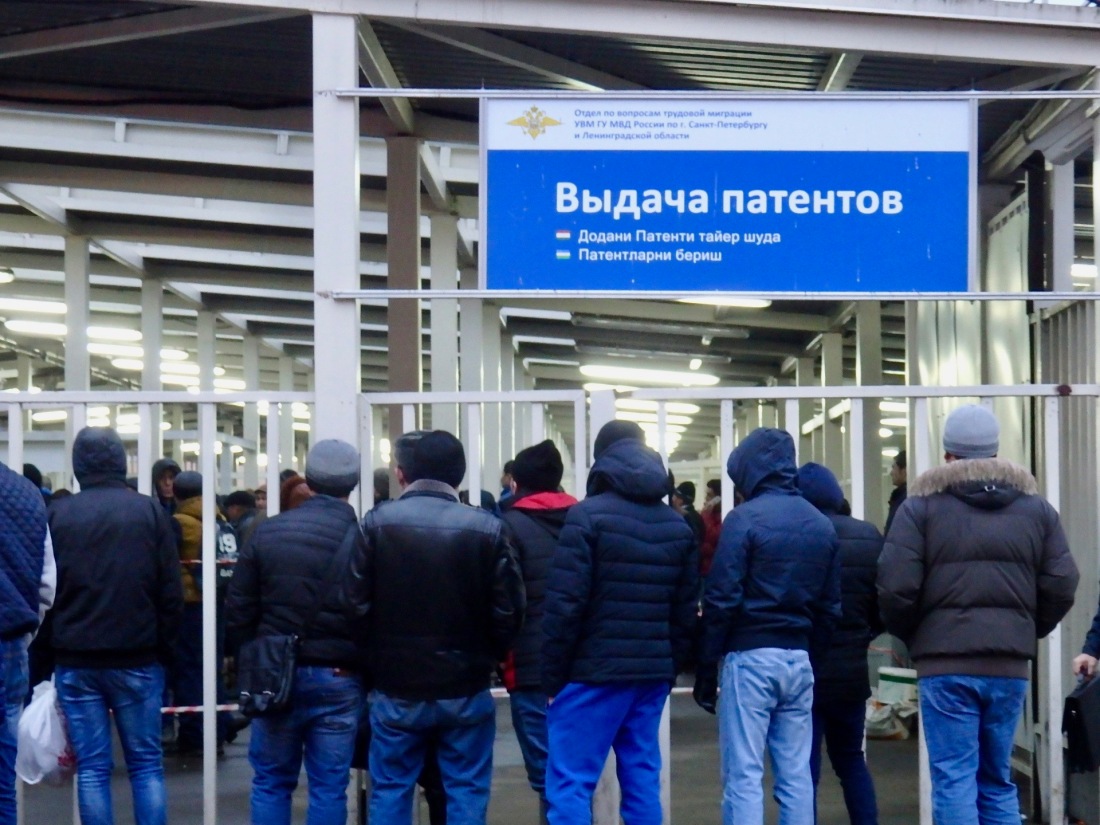 Central Asian migrant workers queuing outside the Russian Interior Ministry’s work permit application center on Red Textile Worker Street in St. Petersburg. Photo by the Russian Reader
Central Asian migrant workers queuing outside the Russian Interior Ministry’s work permit application center on Red Textile Worker Street in St. Petersburg. Photo by the Russian Reader Filling out the forms for extending a work permit. Photo courtesy of Fmskam.ru and Fergana News
Filling out the forms for extending a work permit. Photo courtesy of Fmskam.ru and Fergana News Immigration center in Moscow. Photo courtesy of Mos.ru and Fergana News
Immigration center in Moscow. Photo courtesy of Mos.ru and Fergana News Migrant workers from Kyrgyzstan. Photo courtesy of Kloop.kg and Fergana News
Migrant workers from Kyrgyzstan. Photo courtesy of Kloop.kg and Fergana News Russian riot police (OMON) prepare to enter a business identified as “Uzbek Cuisine” in the Central Market area in Tula during yesterday’s “total spot checks.” Photo courtesy of
Russian riot police (OMON) prepare to enter a business identified as “Uzbek Cuisine” in the Central Market area in Tula during yesterday’s “total spot checks.” Photo courtesy of 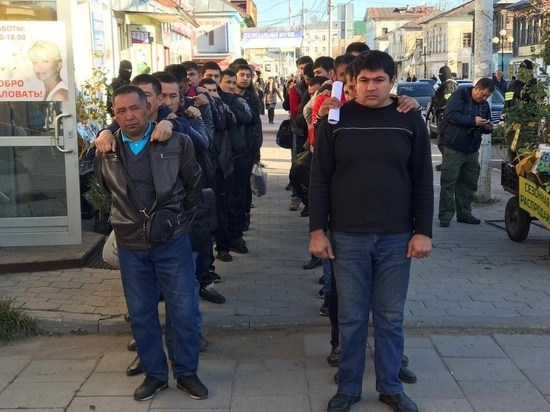
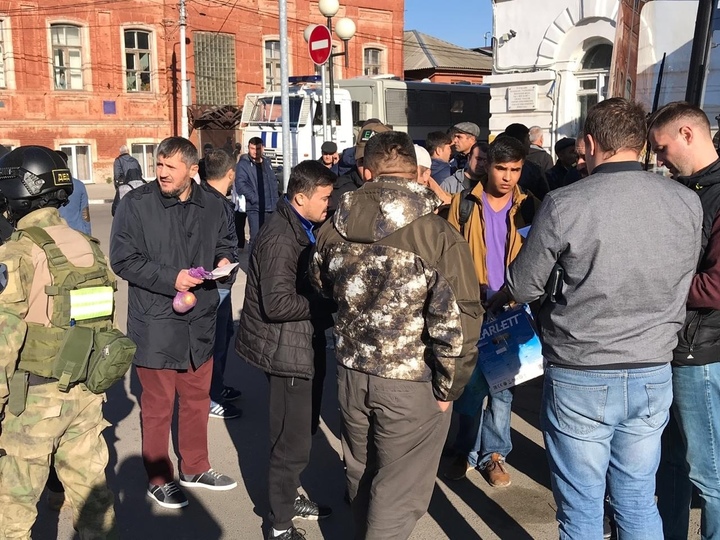
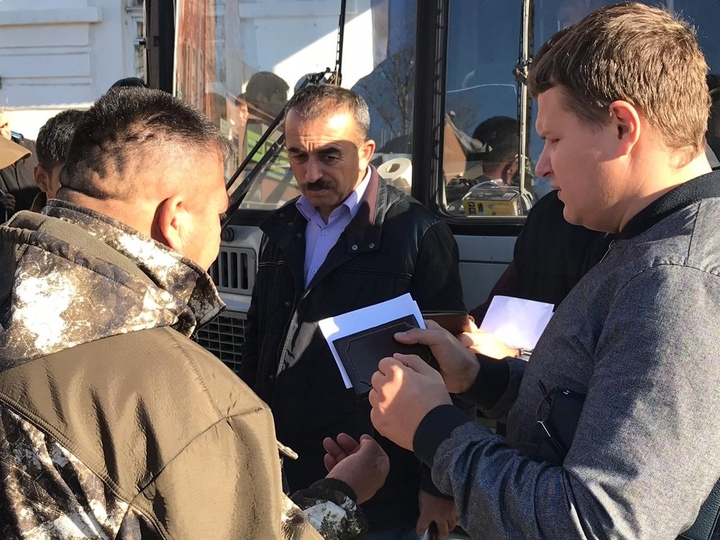
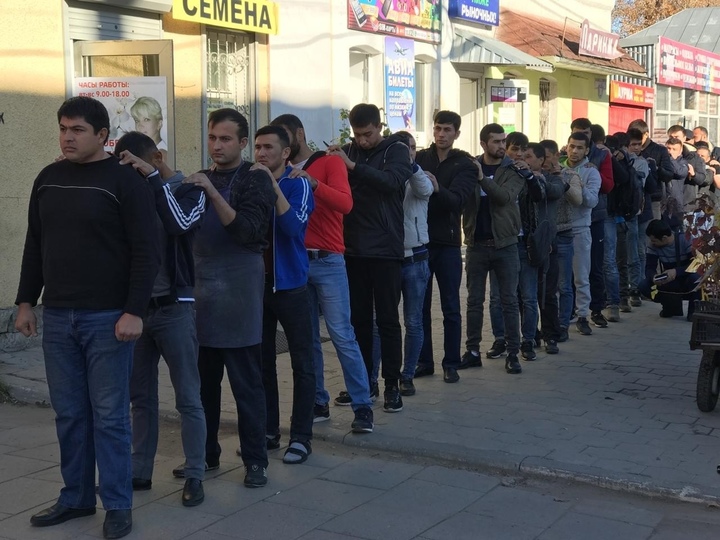
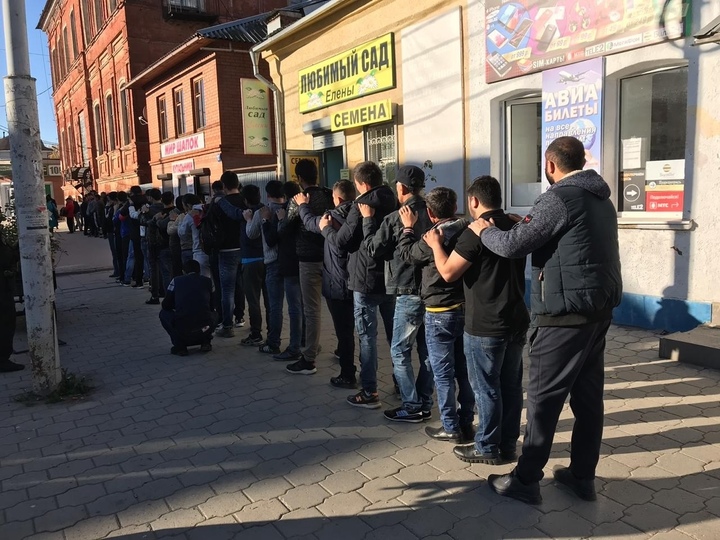
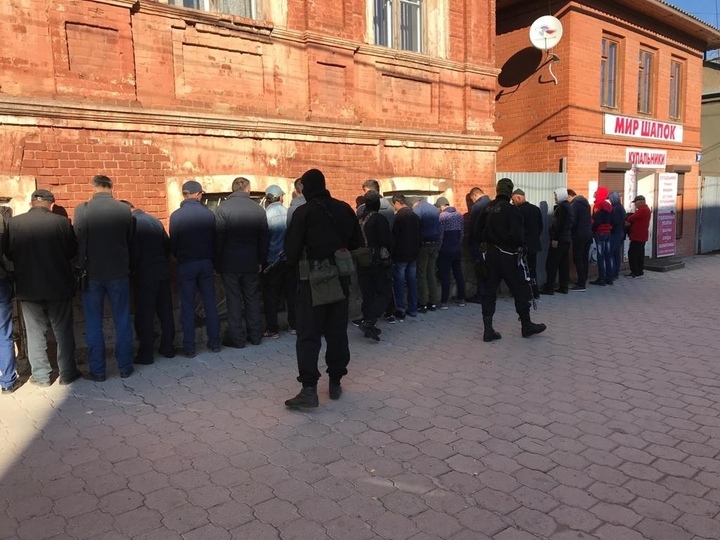
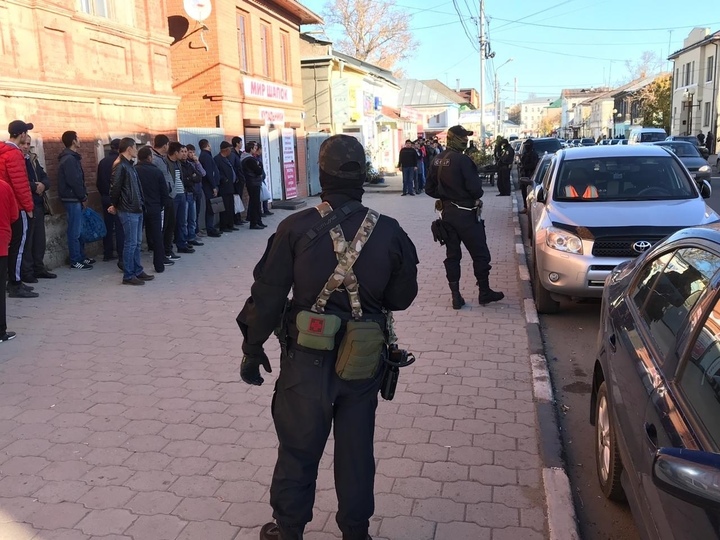
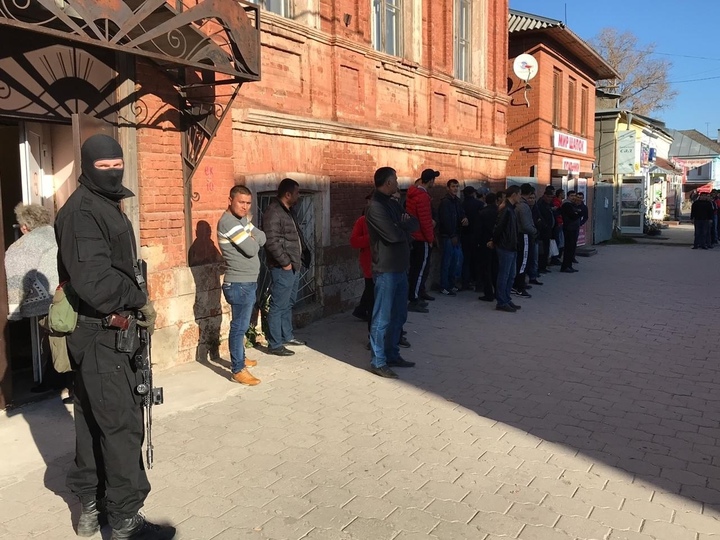
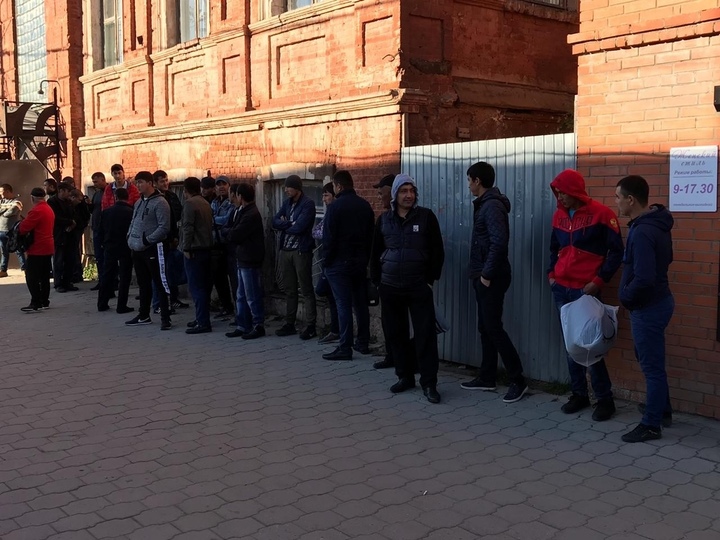
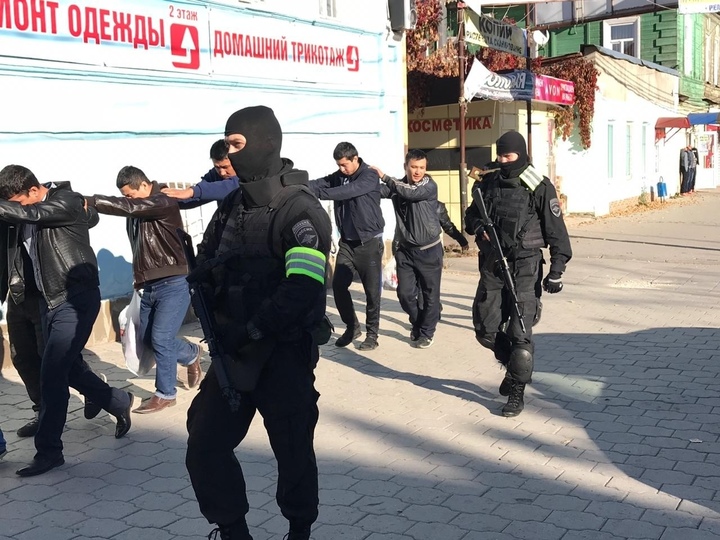
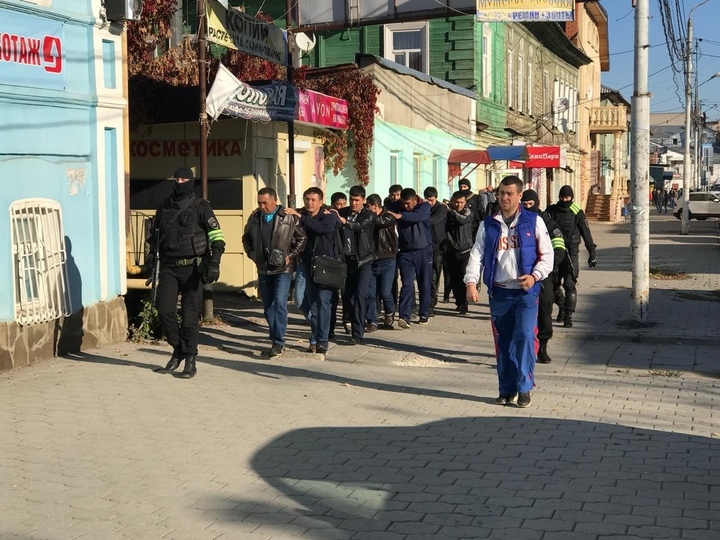
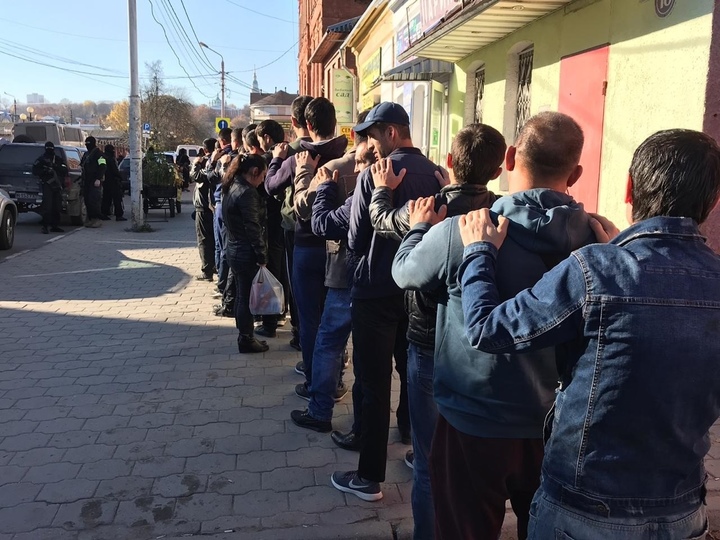
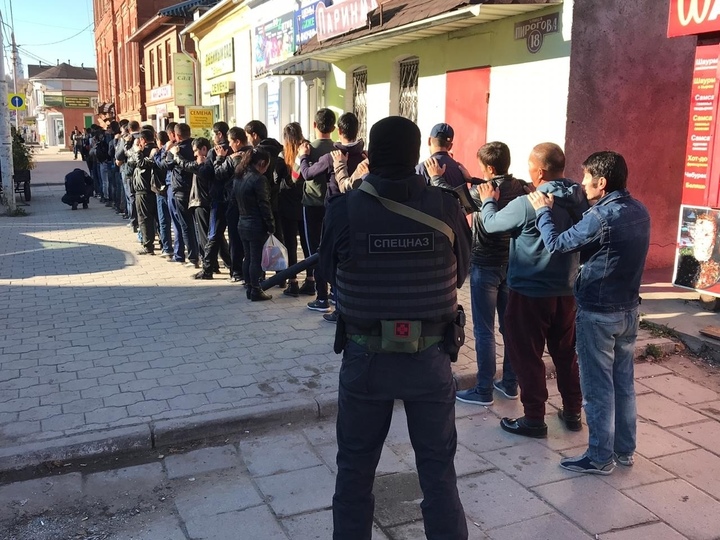
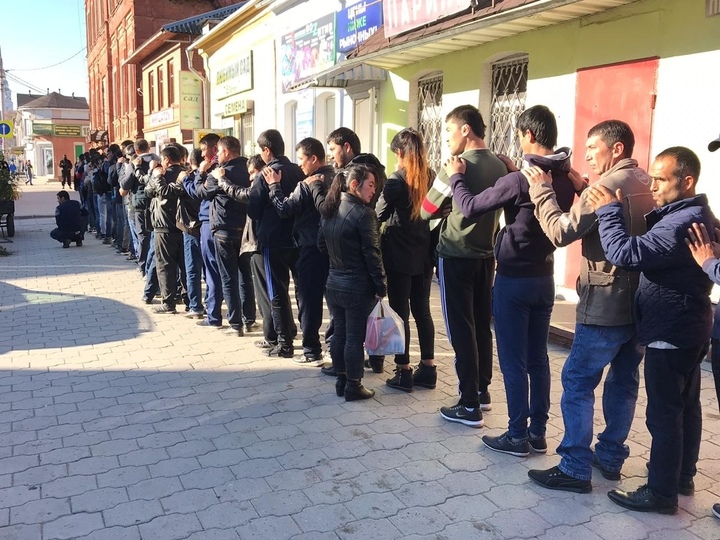
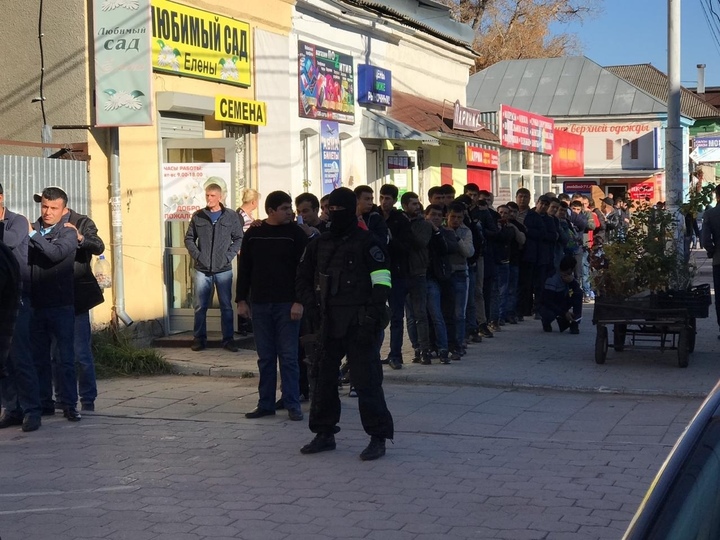
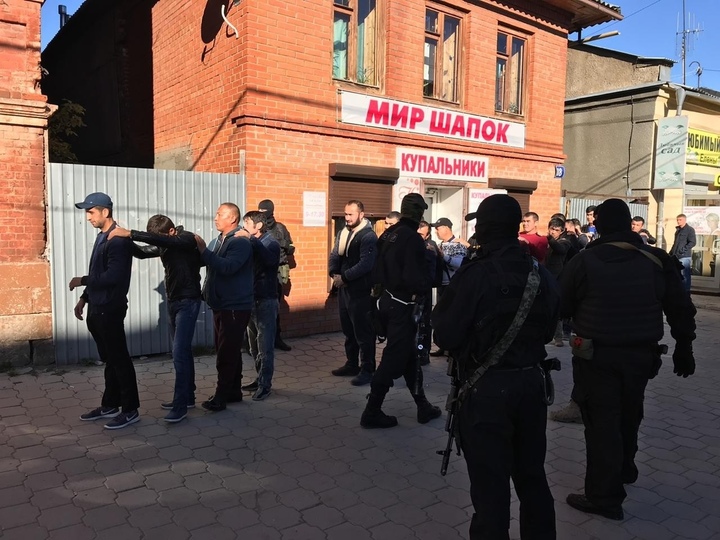
 Photo by Yuri Kozyrev for the project Muscovites. Courtesy of Novaya Gazeta
Photo by Yuri Kozyrev for the project Muscovites. Courtesy of Novaya Gazeta “The forty-fourth day of Sentsov’s hunger strike.” Post on filmmaker
“The forty-fourth day of Sentsov’s hunger strike.” Post on filmmaker